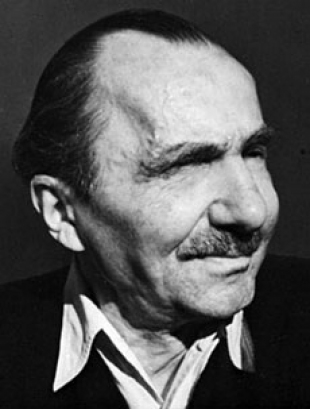Nikos Kazantzakis (1883-1957) was born on this day in Crete. After earning a law degree from the University of Athens, he studied philosophy in Paris and literature and art in Germany and Italy. He used this broad education to become an internationally acclaimed novelist, translator, poet, and travel writer.
Perhaps his most controversial work was The Last Temptation of Christ. In the prologue to the 1955 book, he wrote: "Christ passed through all the stages which the man who struggles passes through. That is why his suffering is so familiar to us; that is why we share it."
Kazantzakis was a tireless pilgrim intent upon understanding the mystery of religious experience. He described his life as "the incessant, merciless battle between the spirit and the flesh." He identified personally with what he saw as the universal predicament of humankind of which Christ's life was the model.
Our favorite work by Kazantzakis is Zorba the Greek, which captures this passionate writer and seeker's ebullient view of life. In the 1964 screen version, Anthony Quinn gives the most natural and astonishing performance of his long and illustrious career as Zorba, a resilient, lusty, jack-of-all trades, who befriends Basil (Alan Bates) a reclusive English writer who owns an abandoned mine on Crete. The Greek becomes the Englishman's spiritual teacher by showing him how to live in the present moment savoring wine, women, and work in equal measure. Best of all, Basil learns how to rise up and dance — even in the face of disaster, defeat and loss.
To Name This Day:
 Films
Films
Watch Zorba the Greek on Amazon streaming.
Watch The Last Temptation of Christ.
 Quotes
Quotes
Enjoy this sampler of Nikos Kazantzakis's Wisdom
Freedom
"I hope nothing. I fear nothing. I am free."
Changing God
"God changes his appearance every second. Blessed is the man who can recognize him in all his disguises."
Enlightenment
"The real meaning of enlightenment is to gaze with undimmed eyes on all darkness."
Transformation
"I said to the almond tree, "Friend, speak to me of God," and the almond tree blossomed.
Meaning
"Everything in this world has a hidden meaning."
Soul
"My entire soul is a cry, and all my work is a commentary on that cry."
And from Zorba the Greek:
The Unforgivable Sin
"If a woman sleeps alone it puts a shame on all men. God has a very big heart, but there is one sin He will not forgive. If a woman calls a man to her bed and he will not go."
Life
"Life is trouble. Only death is not. To be alive is to undo your belt and look for trouble."
Madness
"A person needs a little madness, or else they never dare cut the rope and be free."
*Compare and contrast your views with those of Kazantzakis on one of these subjects: the changing God, the meaning of freedom, the hidden meaning of things, the unforgivable sin, and the ideal of enlightenment.
